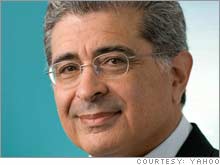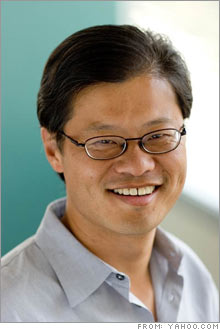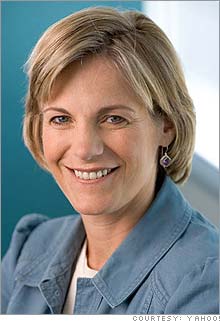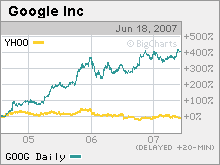Semel out as Yahoo! CEOStruggling No. 2 search engine taps co-founder Jerry Yang as CEO; Semel staying on as chairman; stock surges.NEW YORK (CNNMoney.com) -- Yahoo!, the No. 2 search firm that has struggled in its battle with Google, said Monday that Terry Semel was out as chief executive officer, to be succeeded by Yahoo co-founder Jerry Yang. Susan Decker, who heads a relatively new group that deals with the company's advertisers and publishers, and until recently was also chief financial officer, was promoted to president.
Wall Street cheered the moves, but some online advertising industry experts said Yahoo's new management team still faces tough challenges. Semel, who joined Yahoo (Charts, Fortune 500) as chairman and CEO in May 2001, will stay on as non-executive chairman. But Semel has come under pressure from investors in the past year as the company has fallen further behind top rival Google (Charts, Fortune 500) in the online advertising market. Shares of Yahoo surged 3 percent in heavy trading on Nasdaq Monday as speculation mounted that Semel might step down - and the stock rallied another 4 percent in after-hours trading. Wall Street seemed to welcome the promotion of Yang since he is viewed as being far more tech-savvy than Semel, who had a background in traditional media before joining Yahoo. "Hopefully, Jerry still has much of his entrepreneurial zeal. He is much geekier and you really need to be that rare combination of a technologist and a marketer. Is it the perfect choice? I don't know if it's a perfect choice but it's a good choice," said Kevin Lee, executive chairman of Did-it.com a search marketing firm based in New York. Last week, Semel faced questions from several disappointed investors at the company's annual shareholder meeting about the Yahoo's strategy as well as the fact that Semel, despite only receiving a salary of $1 last year, had a compensation package worth more than $70 million due to stock grants. Earlier this year, Yahoo unveiled an eagerly awaited new search platform for advertisers, called Project Panama. But so far, Panama has failed to boost results for the company. Yahoo reported disappointing results for the first quarter in April and issued weaker-than-expected guidance for the remainder of 2007. Semel has also been criticized by Wall Street for not being as aggressive as Google, MySpace parent News Corp (Charts, Fortune 500). and others in making acquisitions of hot online companies. Yahoo has made numerous acquisitions during the past few years, including photo site Flickr, online video editing tool Jumpcut, bookmark sharing service del.icio.us and, most recently, the remainder in online ad exchange Right Media that Yahoo didn't already own. But Yahoo has failed to make a bold deal that would excite investors. News Corp. bought the popular social networking site MySpace in 2005 and Google acquired online video leader YouTube last year. However, there has been on-and-off speculation that Yahoo has been looking at making an offer for other top social networking sites, including Facebook and Bebo. During a conference call with analysts Monday afternoon, Yang said Yahoo would look to partner with more companies going forward but declined to mention anything more specific. Yahoo's stock has underperformed Google's stock by a wide margin during the past year and since Google went public almost three years ago. That has led to some recent speculation that Yahoo could be a takeover target for Microsoft, (Charts, Fortune 500) whose MSN search engine ranks third behind Google and Yahoo. Yang downplayed questions about whether Yahoo could thrive as an independent company. But he said Yahoo needed to do a better job of differentiating its products in the marketplace, stepping up its investments on innovation and research and development and hiring more engineering talent. "Yahoo is in a position to thrive. We have created a culture of winning. From everything I see around me this culture still runs deep despite our challenges," he said. In a statement, Semel said he wanted to ensure a "smooth succession" and that the time was right for him to step back. During the conference call, he reiterated this and also said that the past year has been a "difficult" one for Yahoo. "I believe Jerry and Sue, with their superb talents and intense dedication to Yahoo! and its people, are the perfect combination to carry us forward," he said. "This is the time for new executive leadership, with different skills and strengths, to step in and drive the company to realize its full potential - it is the right thing to do, and the right time is now," he said. During the call, an emotional Yang expressed his gratitude to Semel for his more than six years at the company and said he looked forward to working more closely with Decker, a former Wall Street analyst who is widely respected by investors. Decker immediately announced more organizational changes. She said the company was no longer looking for a head of its new audience group, which was created in December, since she would assume that role as president. One search industry executive called this a good move. Steve Jacoby, president of sendtraffic, an online search marketing firm that represents advertisers and works closely with Yahoo, Google, MSN and other search engines, said the perception among advertisers was that Yahoo had "too many silos" and was not as efficient as competitors. "They need an operations-minded person to bring Yahoo back together and make it one homogenous business," Jacoby said. During the call, Decker added that she was confident Panama would lead to higher revenue per search during the latter half of the year but that strength in search was being moderated by slower growth in display advertising, ads such as banners, videos and other graphics that are not text-based. She also said that second quarter results should be within the ranges that the company provided to investors in April, but they would probably be between the mid-point and the lower end. Yahoo said in April that it expected revenue, excluding sales it shares with partners, to be be between $1.2 billion and $1.3 billion. Wall Street expects sales of $1.26 billion. Decker said that the upcoming financial results had nothing to do with Semel stepping down. Yahoo's second quarter will end June 30 and the company will report its results July 17. One analyst said it's too soon to tell if the elevation of Yang and Decker and demotion of Semel will benefit Yahoo or not. "Time will tell if this is good for Yahoo. But what strikes me is that there doesn't seem like there will be any radical changes," said Derek Brown, an analyst with Cantor Fitzgerald. A shareholder agreed that the jury is out on whether Yang and Decker can do a better job of competing with Google and others than Semel. "This announcement raises as many questions as it answers. I wouldn't view it as a negative but I don't know if I would view it as a positive either," said Morris Mark, president of Mark Asset Management, a New York-based hedge fund that owns a small stake in Yahoo. Mark said his firm sold most of its stake in Yahoo after the poor earnings report in April, but that it has been buying it back gradually in recent weeks since he thought the stock was cheap and that the company had great assets. But Brown said some investors may be disappointed that Yahoo didn't look outside the company for a successor to Semel. "As I see it, to the extent that Yahoo is facing challenges today, Yang and Decker were on board when the elements were put in place that got Yahoo to the point where it is today," Brown said. He has a "hold" on Yahoo, does not own the stock and his firm has not performed investment banking for the company. |
Sponsors
|




